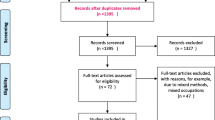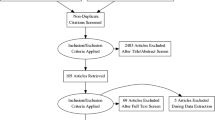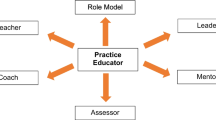Abstract
Strategies specifically designed to facilitate the training of mental health practitioners in evidence-based practices (EBPs) have lagged behind the development of the interventions themselves. The current paper draws from an interdisciplinary literature (including medical training, adult education, and teacher training) to identify useful training and support approaches as well as important conceptual frameworks that may be applied to training in mental health. Theory and research findings are reviewed, which highlight the importance of continued consultation/support following training workshops, congruence between the training content and practitioner experience, and focus on motivational issues. In addition, six individual approaches are presented with careful attention to their empirical foundations and potential applications. Common techniques are highlighted and applications and future directions for mental health workforce training and research are discussed.

Similar content being viewed by others

References
Aarons, G. A., & Palinkas, L. A. (2007). Implementation of evidence-based practice in child welfare: Service provider perspectives. Administration and Policy in Mental Health and Mental Health Services Research, 34, 411–419.
Ackland, R. (1991). A review of the peer coaching literature. Journal of Staff Development, 12, 22–27.
Albanese, M. A., & Mitchell, S. (1993). Problem-based learning: A review of literature on its outcomes and implementation issues. Academic Medicine, 68, 52–81.
Austin, S. M., Balas, E. A., Mitchell, J. A., & Ewigman, B. G. (1994). Effect of physician reminders on preventive care: Meta-analysis of randomized clinical trials. In Proceedings of the annual symposium on computer application in medical care (pp. 121–124).
Baer, J. S., Rosengren, D. B., Dunn, C. W., Wells, E. A., Ogle, R. L., & Hartzler, B. (2004). An evaluation of workshop training in motivation interviewing for addition and mental health clinicians. Drug and Alcohol Dependence, 34, 99–106.
Barrows, H. S. (1984). A specific, problem-based, self-directed learning method designed to teach medical problem-solving skills, self-learning skills and enhance knowledge retention and recall. In H. G. Schmidt & M. L. de Volder (Eds.), Tutorials in problem-based learning. A new direction in teaching the health profession. Assen: Van Gorcum.
Beidas, R. S., & Kendall, P. C. (2010). Training therapists in evidence-based practice: A critical review of studies from a systems-contextual perspective. Clinical Psychology: Science & Practice, 17, 1–30.
Belar, C. D., Brown, R. A., Hersch, L. E., Hornyak, L. M., Rozensky, R. H., Sheridan, E. P., et al. (2001). Self-assessment in clinical health psychology: A model for ethical expansion of practice. Professional Psychology: Research and Practice, 32, 135–141.
Bennett, S., & Bennett, J. W. (2000). The process of evidence-based practice in occupational therapy: Informing clinical decisions. Australian Occupational Therapy Journal, 47, 171–180.
Bennett-Levy, J., & Padesky, C. (2010, June). Reflective practice: Water for the seeds of learning? In McManus, J. (chair). Let a hundred flowers blossom: A variety of effective training practices in CBT. Symposium presented at the 6th World Congress of Behavioral and Cognitive Therapies, Boston, MA.
Berkson, L. (1993). Problem-based learning: Have the expectations been met? Academic Medicine, 68, S79–S88.
Birman, B. F., Desimone, L., Porter, A. C., & Garet, M. S. (2000). Designing professional development that works. Educational Leadership, 57, 28–33.
Blase, K. A., Fixsen, D. L., Duda, M. A., Metz, A. J., Naoom, S. F., & Van Dyke, M. K. (2010, April). Real scale up: Improving access to evidence-based programs. Presentation at the Blueprints Conference, San Antonio, Texas.
Bloom, J. A., Nelson, C. S., Laufman, L. E., Kohrt, A. E., & Kozinetz, C. A. (2007). Improvement in provider immunization knowledge and behavior following a peer education intervention. Clinical Pediatrics, 46, 706–714.
Bruns, E. J., Hoagwood, K. E., Rivared, J. C., Wotring, J., Marsenich, L., & Carter, B. (2008a). State implementation of evidence-based practice for youths, part II: Recommendations for research and policy. Journal of the American Academy of Child and Adolescent Psychiatry, 47, 499–504.
Bruns, E. J., Rast, J., Walker, J. S., Peterson, C. R., & Bosworth, J. (2006). Spreadsheets, service providers, and the statehouse: Using data and the wraparound process to reform systems for children and families. American Journal of Community Psychology, 38, 201–212.
Bruns, E. J., Walker, J. S., & Penn, M. (2008b). Individualized services in systems of care: The wraparound process. In B. Stroul & G. Blau (Eds.), The system of care handbook: Transforming mental health services for children, youth, and families. Baltimore: Brookes.
Buntinx, F., Winkens, R., Grol, R., & Knottnerus, J. A. (1993). Influencing diagnostic and preventive performance in ambulatory care by feedback and reminders. Family Practice, 10, 219–228.
Cannon, D. S., & Allen, S. N. (2000). A comparison of the effects of computer and manual reminders on compliance with a mental health clinical practice guideline. Journal of the American Medical Informatics Association, 7, 196–203.
Chorpita, B. F., Bernstein, A., Daleiden, E. L., & The Research Network on Youth Mental Health. (2009). Driving with roadmaps and dashboards: Using information resources to structure the decision models in service organizations. Administration and Policy in Mental Health, 35, 114–123.
Cohen, J. A., Mannarino, A. P., & Deblinger, E. (2006). Treating trauma and traumatic grief in children and adolescents. New York: Guilford.
Cohen-Schotanus, J., Muijtjens, A. M. M., Schönrock-Adema, J., Geertsma, J., & van der Vleuten, C. P. M. (2008). Effects of convention and problem-based learning on clinical and general competencies and career development. Medical Education, 42, 256–265.
Colliver, J. A. (2000). Effectiveness of problem-based learning curricula: Research and theory. Academic Medicine, 75, 259–266.
Coomarasamy, A., & Khan, K. S. (2004). What is the evidence that postgraduate teaching in evidence based medicine changes anything? A systematic review. British Medical Journal, 329, 1017.
Daleiden, E. L., & Chorpita, B. F. (2005). From data to wisdom: Quality improvement strategies supporting large-scale implementation of evidence-based services. Child and Adolescent Psychiatric Clinics of North America, 14, 329–349.
Davis, D. A., & Taylor-Vaisey, A. (1997). Translating guidelines into practice: A systematic review of theoretic concepts, practice experience and research evidence in the adoption of clinical practice guidelines. Canadian Medical Association Journal, 157, 408–416.
Davis, D. A., Thompson, M. A., Oxman, A. D., & Haynes, R. B. (1995). Changing physician performance: A systematic review of the effect of continuing medical education strategies. Journal of the American Medical Association, 274, 700–705.
Dexheimer, J. W., Talbot, T. R., Sanders, D. L., Rosenbloom, S. T., & Aronsky, D. (2008). Prompting clinicians about preventive care measures: A systematic review of randomized controlled trials. Journal of the American Medical Informatics Association, 15, 311–320.
Dimeff, L. A., Koerner, K., Woodcock, E. A., Beadnell, B., Brown, M. Z., Skutch, J. M., et al. (2009). Which training method works best? A randomized controlled trial comparing three methods of training clinicians in dialectical behavior therapy skills. Behaviour Research and Therapy, 47, 921–930.
Dochy, F., Segers, M., van den Bossche, P., & Gijbels, D. (2003). Effects of problem based learning: A meta-analysis. Learning and Instruction, 13, 533–568.
Eyberg, S. M., Boggs, S. R., & Algina, J. (1995). Parent-child interaction therapy: A psychosocial model for the treatment of young children with conduct problem behavior and their families. Psychopharmacology Bulletin, 31, 83–91.
Feifer, C., Ornstein, S. M., Jenkins, R. G., Wessell, A., Corley, S. T., Nemeth, L. S., et al. (2006). The logic behind a multimethod intervention to improve adherence to clinical practice guidelines in a nationwide network of primary care practices. Evaluation and the Health Professions, 29, 65–88.
Fishbein, M., Triandis, H., Kanfer, F., Becker, M., Middlestadt, S., & Eichler, A. (2001). Factors influencing behavior and behavior change. In A. Baum, T. Revenson, & J. Singer (Eds.), Handbook of health psychology. Mahwah, NJ: Erlbaum.
Fisher, P. A., & Chamberlain, P. (2000). Multidimensional treatment foster care: A program for intensive parenting, family support, and skill building. Journal of Emotional and Behavioral Disorders, 8, 155–164.
Fixsen, D. L., Naoom, S. F., Blase, K. A., Friedman, R. M., & Wallace, F. (2005). Implementation research: A synthesis of the literature. Tampa, FL: University of South Florida, Louis de la Parte Florida Mental Health Institute, The National Implementation Research Network.
Forsetlund, L., Bjørndal, A., Rashidian, A., Jamtvedt, G., O’Brien, M. A., Wolf, F., et al. (2009). Continuing education meetings and workshops: Effects on professional practice and health care outcomes. Cochrane Database of Systematic Reviews, Issue 2. John Wiley & Sons.
Ganju, V. (2003). Implementation of evidence-based practices in state mental health systems: Implications for research and effectiveness studies. Schizophrenia Bulletin, 29, 125–131.
Garet, M. S., Porter, A. C., Desimone, L., Birman, B. F., & Yoon, K. S. (2001). What makes professional development effective? Results from a national sample of teachers. American Educational Research Journal, 38, 915–945.
Garland, A. F., Brookman-Frazee, L., Hurlburt, M. S., Accurso, E. C., Zoffnes, R. J., Haine-Schlagel, R., et al. (2010). Mental health care for children with disruptive behavior problems: A view inside therapists’ offices. Psychiatric Services, 61, 788–795.
Garland, A. F., Kruse, M., & Aarons, G. A. (2003). Clinicians and outcome measurement: What’s the use? Journal of Behavioral Health Services & Research, 30, 393–405.
Gijbels, D., Dochy, F., van den Bossche, P., & Segers, M. (2005). Effects of problem-based learning: A meta-analysis from the angle of assessment. Review of Educational Research, 75, 27–61.
Glaser, R. (1990). Toward new models for assessment. International Journal of Educational Research, 14, 475–483.
Gotham, H. J. (2006). Advancing the implementation of evidence-based practices into clinical practice: How do we get there from here? Professional Psychology: Research and Practice, 37, 606–613.
Grimshaw, J. M., Eccles, M. P., & Walker, A. E. (2002). Changing physicians’ behavior: What works and thoughts on getting more things to work. Journal of Continuing Education in the Health Professions, 22, 237–243.
Grimshaw, J. M., Shirran, L., Thomas, R., Mowatt, G., Fraser, C., Bero, L., et al. (2001). Changing provider behavior: An overview of systematic reviews of interventions. Medical Care, 39, II-2–II-45.
Grindrod, K. A., Patel, P., & Martin, J. E. (2006). What interventions should pharmacists employ to impact health practitioners’ prescribing practices? Annals of Pharmacotherapy, 40, 1546–1557.
Guskey, T. R. (1994). Results-oriented professional development: In search of an optimal mix of effective practices. Journal of Staff Development, 15, 42–50.
Hammick, M., Freeth, D., Koppel, I., Reeves, S., & Barr, H. (2007). A best evidence systematic review of interprofessional education. Medical Teacher, 29, 735–751.
Han, S. S., & Weiss, B. (2005). Sustainability of teacher implementation of school-based mental health programs. Journal of Abnormal Child Psychology, 33, 665–679.
Hannah, S. T., Woolfolk, R. L., & Lord, R. G. (2009). Leader self-structure: A framework for positive leadership. Journal of Organizational Behavior, 30, 269–290.
Hawkins, K. A., & Sinha, R. (1998). Can front-line clinicians master the conceptual complexities of dialectical behavior therapy? An evaluation of a State Department on Mental Health training program. Journal of Psychiatric Research, 32, 379–384.
Haynes, R. B., Hayward, R. S., & Lomas, J. (1995). Bridges between health care research evidence and clinical practice. Journal of the American Medical Informatics Association, 2, 342–350.
Haynes, A. B., Weiser, T. G., Berry, W. R., Lipsitz, S. R., Breizat, A. H., Dellinger, E. P., et al. (2009). A surgical safety checklist to reduce morbidity and mortality in a global population. New England Journal of Medicine, 360, 491–499.
Henggeler, S. W. (1999). Multisystemic therapy: An overview of clinical procedures, outcomes, and policy implications. Child Psychology and Psychiatry Review, 4, 2–10.
Herschell, A. D., Kolko, D. J., Baumann, B. L., & Davis, A. C. (2010). The role of therapist training in the implementation of psychosocial treatments: A review and critique with recommendations. Clinical Psychology Review, 30, 448–466.
Hoge, M. A., & Morris, J. A. (Eds.). (2004). Implementing best practices in behavioral health workforce education: Building a change agenda [Special issue]. Administration and Policy in Mental Health, 32, 85–89.
Hoge, M. A., Morris, J. A., Daniels, A. S., Stuart, G. W., Huey, L. Y., & Adams, N. (2007). An action plan for behavioral health workforce development. Cincinnati, OH: Annapolis Coalition on the Behavioral Health Workforce.
Hoge, M. A., Tondora, J., & Stuart, G. W. (2003). Training in evidence-based practice. Psychiatric Clinics of North America, 26, 851–865.
Joyce, B. R., & Showers, B. (2002). Student achievement through staff development (3rd ed.). Alexandria, VA: Association for Supervision and Curriculum Development.
Kazdin, A. E. (2008). Evidence-based treatment and practice: New opportunities to bridge clinical research and practice, enhance the knowledge base, and improve patient care. American Psychologist, 63, 146–159.
Kelleher, K. (2010). Organizational capacity to deliver effective treatments for children and adolescents. Administration and Policy in Mental Health and Mental Health Services Research, 37, 89–94.
Kerns, S. E. U., Dorsey, S., Trupin, E. W., & Berliner, L. (2010). Project focus: Promoting emotional health and wellbeing for youth in foster care through connections to evidence-based practices. Report on Emotional and Behavioral Disorders in Youth, 10, 30–38.
Kirschner, P. A., Sweller, J., & Clark, R. E. (2006). Why minimal guidance during instruction does not work: An analysis of the failure of constructivist, discover, problem-based, experiential, and inquiry-based teaching. Educational Psychologist, 41, 75–86.
Knowles, M. S. (1968). Andragogy, not pedagogy. Adult Leadership, 16, 350–352.
Linehan, M. (1993). Cognitive-behavioral treatment of borderline personality disorder. New York: Guildford Press.
Long, N. (2008). Closing the gap between research and practice: The importance of practitioner training. Clinical Child Psychology and Psychiatry, 13, 187–190.
Markey, P., & Schattner, P. (2001). Promoting evidence-based medicine in general practice—the impact of academic detailing. Family Practice, 18, 364–366.
McCarthy, P., & Kerman, B. (2010). Inside the belly of the beast: How bad systems trump good programs. Administration and Policy in Mental Health and Mental Health Services Research, 37, 167–172.
McHugh, R. K., & Barlow, D. H. (2010). The dissemination and implementation of evidence-based psychological treatments: A review of current efforts. American Psychologist, 65, 73–84.
Merriam, S. B., & Caffarella, R. S. (1999). Learning in adulthood: A comprehensive guide. San Francisco, CA: Jossy-Bass Publishers.
Meverach, Z. R. (1995). Teachers’ paths on the way to and from the professional development forum. In T. R. Guskey & M. Huberman (Eds.), Professional development in education: New paradigms & practices (pp. 151–170). New York: Teachers College Press.
Miller, W. R., & Rollnick, S. (2002). Motivational Interviewing (2nd ed.). New York: Guilford Press.
Miller, W. R., Yahne, C. E., Moyers, T. B., Marinez, J., & Pirritano, M. (2004). A randomized trial of methods to help clinicians learn motivational interviewing. Journal of Consulting and Clinical Psychology, 72, 1050–1062.
Moll, L. C. (Ed.). (1990). Vygotsky and education: Instructional implications of sociohistorical psychology. Cambridge, England: Cambridge University Press.
Muijs, D., & Lindsay, G. (2008). Where are we at? An empirical study of levels and methods of evaluating continuing professional development. British Educational Research Journal, 34, 195–211.
Murray, S., Ma, X., & Mazer, J. (2008). Effects of peer coaching on teachers’ collaborative interaction and students’ mathematics achievement. The Journal of Educational Research, 102, 203–212.
Nardella, A., Pechet, L., & Snyder, L. M. (1995). Continuous improvement, quality control, and cost containment in clinical laboratory testing: Effects of establishing and implementing guidelines for preoperative tests. Archives of Pathology & Laboratory Medicine, 119, 518–522.
O’Brien, M. A., Rogers, S., Jamtvedt, G., Oxman, A. D., Odgaard-Jensen, J., Kristoffersen, D. T., et al. (2008). Educational outreach visits: Effects on professional practice and health care outcomes. Cochrane Database of Systematic Reviews, Issue 4. Wiley.
Ockene, J. K., & Zapka, J. G. (2000). Provider education to promote implementation of clinical practice guidelines. Chest, 118, 33S–39S.
Oxman, A. D., Thomson, M. A., Davis, D. A., & Haynes, R. B. (1995). No magic bullets: A systematic review of 102 trials of interventions to improve professional practice. Canadian Medical Association Journal, 153, 1423–1431.
Phan, H. P. (2010). Critical thinking as a self-regulatory process component in teaching and learning. Psicothema, 22, 284–292.
Pintrich, P. R. (2000). Multiple goals, multiple pathways: The role of goal orientations in learning and achievement. Journal of Educational Psychology, 92, 544–555.
Pintrich, P. R. (2004). A conceptual framework for assessing motivation and self-regulated learning in college students. Educational Psychology Review, 16, 385–407.
Puetz, B. E. (1980). Differences between Indiana registered nurse attenders and nonattenders in continuing education in nursing activities. Journal of Continuing Education in Nursing, 11, 19–26.
Reeves, S. (2009). An overview of continuing interprofessional education. Journal of Continuing Education in the Health Professions, 29, 142–146.
Reeves, S. (2010). The effectiveness of interprofessional education: Key findings from a new systematic review. Journal of Interprofessional Care, 24, 230–241.
Ripple, R. E., & Drinkwater, D. J. (1982). Transfer of learning. In H. E. Mitzel (Ed.), Encyclopedia of educational research (Vol. 4, pp. 1947–1954). New York: Free Press.
Sackett, D. L. (1997). Evidence-based medicine. Seminars in Perinatology, 21, 3–5.
Sanders, M. R. (1999). The Triple P-Positive parenting program: Towards an empirically validated multilevel parenting and family support strategy for the prevention of behavior and emotional problems in children. Clinical Child and Family Psychology Review, 2, 71–90.
Sanders, M. R., & Murphy-Brennan, M. (2010). Creating conditions for success beyond the professional training environment. Clinical Psychology: Science and Practice, 17, 31–35.
Sansone, C., & Thoman, D. B. (2006). Maintaining activity engagement: Individual differences in the process of self-regulating motivation. Journal of Personality, 74, 1697–1720.
Schoenwald, S. K., Henggeler, S. W., Brondino, M. J., & Rowland, M. D. (2000). Multisystemic therapy: Monitoring treatment fidelity. Family Process, 39, 83–103.
Schoenwald, S. K., Sheidow, A. S., & Letourneau, E. J. (2004). Toward effective quality assurance in evidence-based practice: Links between expert consultation therapist fidelity, and child outcomes. Journal of Child and Adolescent Clinical Psychology, 33, 94–104.
Shea, S., DuMouchel, W., & Bahamonde, L. (1996). A meta-analysis of 16 randomized controlled trials to evaluate computer-based clinical reminder systems for preventive care in the ambulatory setting. Journal of the American Medical Informatics Association, 3, 399–409.
Shojania, K. G., Jennings, A., Mayhew, A., Ramsay, C., Eccles, M., & Grimshaw, J. (2010). Effect of point-of-care computer reminders on physician behavior: A systematic review. Canadian Medical Association Journal, 182, E216–E225.
Sholomskas, D. E., Syracuse-Siewert, G., Rounsaville, B. J., Ball, S. A., Nuro, K. F., & Carroll, K. M. (2005). We don’t train in vain: A dissemination trial of three strategies of training clinicians in cognitive-behavioral therapy. Journal of Consulting and Clinical Psychology, 73, 106–115.
Showers, B. (1984). Peer coaching: A strategy for facilitating transfer of training. Portland, OR: Center for Educational Policy and Management.
Showers, B., Joyce, B., & Bennett, B. (1987). Synthesis of research on staff development: A framework for future study and state-of-the-art analysis. Educational Leadership, 45, 77–87.
Siqueland, L., Crits-Christoph, P., Barber, J. P., Butler, S. F., Thase, M., Najavits, L., et al. (2000). The role of therapist characteristics in training effects in cognitive, supportive-expressive, and drug counseling therapies for cocaine dependence. Journal of Psychotherapy Practice Research, 9, 123–130.
Smits, P. B. A., Verbeek, J. H. A. M., & De Buisonje, C. D. (2002). Problem based learning in continuing medical education: A review of controlled evaluation studies. British Medical Journal, 321, 153–156.
Soumerai, S. (1998). Principles and uses of academic detailing to improve the management of psychiatric disorders. International Journal of Psychiatry in Medicine, 28(1), 81–96. doi:10.2190/BTCA-Q06P-MGCQ-R0L5.
Soumerai, S. B., & Avorn, J. (1987). Predictors of physician prescribing change in an educational experiment to improve medication use. Medical Care, 25, 210–221.
Soumerai, S. B., & Avorn, J. (1990). Principles of educational outreach (‘academic detailing’) to improve clinical decision making. Journal of the American Medical Association, 263, 549–556.
Soumerai, S. B., Salern-Schatz, S., Avorn, J., Casteris, C. S., Ross-Degnan, D., & Popvsky, M. A. (1993). A controlled trial of educational outreach to improve blood transfusion practice. Journal of the American Medical Association, 270, 961–966.
Speck, M. (1996). Best practice in professional development for sustained educational change. ERS Spectrum, 14, 33–41.
Stein, L. I., & Santos, A. B. (1998). Assertive community treatment of persons with severe mental illness. New York: W. W. Norton & Company.
Stirman, S. W., Bhar, S. S., Spokas, M., Brown, G. K., Creed, T. A., Perivoliotis, D., et al. (2010). Training and consultation in evidence-based psychosocial treatments in public mental health settings: The ACCESS model. Professional Psychology: Research and Practice, 41, 48–56.
Stokes, T. F., & Baer, D. M. (1977). An implicit technology of generalization. Journal of Applied Behavior Analysis, 10, 349–367.
Stuart, G. W., Tondora, J., & Hoge, M. A. (2004). Evidence-based teaching practice: Implications for behavioral health. Administration and Policy in Mental Health, 32, 107–130.
Tan, K. M. (2002). Influence of educational outreach visits on behavioral change in health professionals. Journal of Continuing Education of Health Professionals, 22, 122–124.
Taylor, D., & Mifflin, B. (2008). Problem-based learning: Where are we now? Medical Teacher, 30, 742–763.
Thompson, J. L. (1976). The concept of training and its current distortion. Adult Education, 49, 146–153.
Tierney, W. M., Hui, S. L., & McDonald, C. J. (1986). Delayed feedback of physician performance versus immediate reminders to perform preventive care. Medical Care, 24, 659–666.
Tseng, V., & Senior Program Team. (2007). Focusing on demand: Studying research use in policy and practice affecting youth. Retrieved on June 12, 2010, from http://www.wtgrantfdn.org/resources/overview/studying_the_use_of_research_evidence.
Tulinius, C., & Hølge-Hazelton, B. (2010). Continuing professional development for general practitioners: Supporting the development of professionalism. Medical Education, 44, 412–420.
van den Hombergh, P., Grol, R., van den Hoogen, H. J. M., & van den Bosch, W. J. H. M. (1999). Practice visits as a tool in quality improvement: Mutual visits and feedback by peers compared with visits and feedback by non-physician observers. Quality in Health Care, 8, 161–166.
van Oorsouw, W., Embregts, P., Bosman, A. M. T., & Jahoda, A. (2009). Training staff serving clients with intellectual disabilities: A meta-analysis of aspects determining effectiveness. Research in Developmental Disabilities, 30, 503–511.
Veenman, S., & Denessen, E. (2001). The coaching of teachers: Results of five training studies. Educational Research and Evaluation, 7, 385–417.
Veenman, S., Visser, Y., & Wijkamp, N. (1998). Implementation effects of a program for the training of coaching skills with school principals. School Effectiveness & School Improvement, 9, 135.
Vernon, D. T. A., & Blake, R. L. (1993). Does problem-based learning work? A meta-analysis of evaluative research. Academic Medicine, 68, 550–563.
Walker, J. S., & Bruns, E. J. (2006). Building on practice-based evidence: Using expert perspectives to define the wraparound process. Psychiatric Services, 57, 1579–1585.
Wandersman, A., Duffy, J., Flaspholer, P., Noonan, R., Lubell, K., Stillman, L., et al. (2008). Bridging the gap between prevention research and practice: The interactive systems framework for dissemination and implementation. American Journal of Community Psychology, 41, 171–181.
Weissman, M. M., Verdeli, H., Gameroff, M. J., Bledsoe, S. E., Betts, K., Mufson, L., et al. (2006). National survey of psychotherapy training in psychiatry, psychology, and social work. Archives of General Psychiatry, 63, 925–934.
Wenger, E. (1998). Communities of practice: Learning, meaning and identity. Cambridge: Cambridge University Press.
Zimmerman, B. J. (2000). Becoming a self-regulated learner: An overview. Theory into Practice, 41, 64–70.
Zwart, R. C., Wubbels, T., Bergen, T. C. M., & Bolhuis, S. (2007). Experienced teacher learning within the context of reciprocal peer coaching. Teachers and Teaching, 13, 165–187.
Acknowledgments
This publication was made possible in part by grant number F32 MH086978 from the National Institute of Mental Health (NIMH), awarded to the first author.
Author information
Authors and Affiliations
Corresponding author
Rights and permissions
About this article
Cite this article
Lyon, A.R., Stirman, S.W., Kerns, S.E.U. et al. Developing the Mental Health Workforce: Review and Application of Training Approaches from Multiple Disciplines. Adm Policy Ment Health 38, 238–253 (2011). https://doi.org/10.1007/s10488-010-0331-y
Published:
Issue Date:
DOI: https://doi.org/10.1007/s10488-010-0331-y



